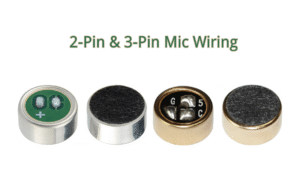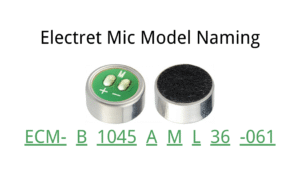
1. Why Consistency Matters in Component-Level Manufacturing
As the core sensing component in audio products, microphone elements—such as electret, dynamic, SMD (surface-mount), and MEMS types—play a vital role in determining overall sound quality, noise reduction algorithms, and mic array pairing. Even small deviations in consistency can lead to noticeable differences in final product performance.
🌟 Market Demand: Increasingly, brands and device manufacturers require ±1dB sensitivity consistency to align with voice recognition systems and acoustic design specifications.
⚠️ Manual Production Limitations: Traditional manual assembly processes often introduce variability—especially when production volumes reach millions of units annually.
2. How We Ensure Consistency: From Structure to Data Screening
✅ Precision Structural Design
- Metal housings machined with ±0.03mm dimensional tolerance.
- Membrane-to-backplate spacing controlled within ±0.02mm for consistent frequency response and sensitivity.
✅ Automated Assembly Workflow
| Assembly Stage | Automation Techniques |
|---|---|
| Membrane & Backplate Assembly | Automated assembly |
| Lead Pin Soldering (Pin-type) | Automated soldering |
| Case Sealing | Automated pressing & sealing |
| Electrical Testing | Automated electrical testing |
✅ Electroacoustic Auto-Screening
- Inline full inspection of sensitivity, SNR, impedance, and leakage current.
- ±1dB bin sorting available—ideal for differential pair matching or mic arrays.
- Frequency response reports auto-generated with deviation analysis versus master sample.
3. Automated vs Manual Production
| Criteria | Manual Production | Automated Production |
|---|---|---|
| Sensitivity Consistency | ±3~4dB (inconsistent) | Controlled within ±1~1.5dB |
| Soldering Quality | Variable temp & manual skill | Stable soldering with auto-feed |
| Yield Rate | 85–90% | 99.9% |
| Return Rate | Occasional batch failures | Near zero, with traceable QC |
| MFTT | N/A | < 10 PPM |
| Automation Aspects | Manual testing, manual assembly | Automated testing, edge sealing, and assembly |
4. Supported Microphone Structures
- Electret Capsules: Pin-type, wire-type, and SMD options—all eligible for precision control output.
- Dynamic Capsules: Controlled membrane thickness and magnetic uniformity.
- MEMS Microphones: In-process testing and bin sorting in collaboration with OEM sources.
- Custom Designs: BOM-based feasibility evaluation and automated testing supported.
Automation is not just about increasing capacity—it’s essential for ensuring consistency and enhancing brand reliability. We embed consistency controls at every stage: from design, assembly, to testing. Our microphone elements deliver stable, precise, and high-performance audio sensing for brands and manufacturers worldwide.
Interested in precision testing or customized control? Contact us for samples and technical documentation.


